
Workshop Series on Innovations in Biomaterials Science
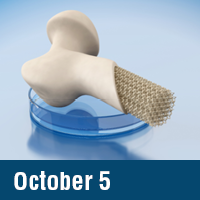
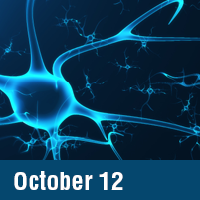

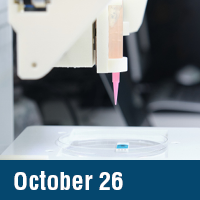

3D Printing for Medical Applications
3D printing, also known as additive manufacturing and solid freeform fabrication, is an approach involving additive layer-by-layer fabrication of a three-dimensional structure through selective joining of material; processing of the structure is directed by a computer-aided design (CAD) model. Unlike conventional methods, 3D printing techniques may enable the development of structures with well-defined small-scale features and multiple functions. This workshop addressed recent 3D printing for medical applications with a focus on recent advances in biomaterials for 3D printing and recent efforts to translate 3D printing technology. In particular, efforts to characterize 3D printed materials via in vitro and in vivo methods were considered. The processing of radiographic images and the development of computer models were also discussed.
Program and Speakers

Scaffold-guided Tissue Engineering from Bench to Bedside
Dietmar W. Hutmacher, Queensland University of Technology
Dietmar Hutmacher is a biomedical engineer, educator, inventor, and creator of new intellectual property opportunities. He is committed to fostering transformative research and pedagogical innovation as well as programs that create an entrepreneurial mindset amongst faculty and students. He directs the Centre for Regenerative Medicine and the ARC Training Centre in Additive Biomanufacturing at QUT, an interdisciplinary team of researchers including engineers, cell biologists, polymer chemists, clinicians, and veterinary surgeons. Hutmacher is an internationally recognized leader in the fields of biomaterials, tissue engineering and regenerative medicine with expertise in commercialization. He has translated a bone tissue engineering concept from the laboratory through to clinical application involving in vitro experiments, preclinical studies and ultimately clinical trials. His recent research efforts have resulted in traditional scientific/academic outputs as well as pivotal commercialization outcomes. His pre-eminent international standing and impact on the field are illustrated by fact that he is listed as a highly cited researcher.
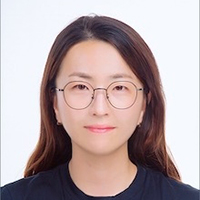
dECM Bioinks for Engineering Tissue and Organ Specific Microenvironment
Jinah Jang, Pohang University of Science and Technology
Jinah Jang received her PhD degree at Pohang University of Science and Technology (POSTECH), and trained as postdoctoral fellow in POSTECH and Institute for Stem Cell and Regenerative Medicine at University of Washington. She joined the POSTECH in 2017 and is an associate professor in the Convergence IT Engineering, Mechanical Engineering, and School of Interdisciplinary Bioscience and Bioengineering. Jang has published more than 70 peer-reviewed articles in journals including Chemical Reviews, Science Advances, Nature Communications, and Biomaterials. She serves as an Editorial Board Member of the International Journal of Molecular Science, Applied Sciences, and Journal of Korean Society for Precision Engineering and as the Associate Editor of Essays in Biochemistry. She has served as a board member of multiple academic societies including Early Career ResearchersCommittee of International Society for Biofabrication, and the Korean Society for Precision Engineering. Jang has received numerous awards including the ISBF young scientist award (2014), Presidential Postdoc Fellowship from NRF Korea (2015), Excellence Young Researcher Award from Korea Society for Biomaterials (2020) and Korea Tissue Engineering and Regenerative Medicine Society (2021). Her research interest lies in engineering the functional human tissues using high-performance stem cells and printable biomaterials-based 3D bioprinting technology.
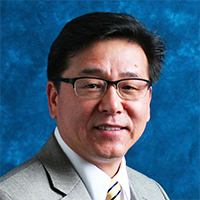
Bioprinting for Translational Applications
James Yoo, Wake Forest Institute for Regenerative Medicine
James Yoo is Professor and Associate Director of the Wake Forest Institute for Regenerative Medicine (WFIRM), with a cross-appointment to the Departments of Urology, Physiology and Pharmacology, and the Virginia Tech-Wake Forest School of Biomedical Engineering and Sciences. Yoo's research efforts have been directed toward the clinical translation of tissue engineering technologies and cell-based therapies. His background in cell biology and medicine has facilitated the transfer of several cell-based technologies from the bench-top to the bedside. A few notable examples of successful clinical translation include the bladder, urethra, vagina, and muscle cell therapy for incontinence. Yoo has been a lead scientist in the bioprinting program at WFIRM and was instrumental in developing skin bioprinting and integrated tissue and organ printing (ITOP) systems for preclinical and clinical applications.
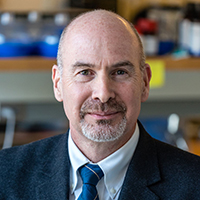
A Design Control Paradigm for Clinical Application of 3D Printed Patient Specific Scaffolds
Scott Hollister, Georgia Institute of Technology
Scott Hollister is the Patsy and Alan Dorris Chair in Pediatric Technology and Professor of Biomedical Engineering at the Georgia Institute of Technology. He directs the Center for 3D Medical Fabrication as well as the Tissue Engineering and Mechanics Laboratory at Georgia Tech. Hollister’s research focuses on the computational design, 3D printing fabrication and characterization of biomaterial devices and scaffolds for tissue reconstruction. He was co-inventor of an airway splint in both resorbable and permanent versions that to date has been implanted and saved the lives of 25 children with Tracheobronchomalacia. This work has been featured in a number of mainstream media outlets including The Today Show, NPR, CNN, the New Yorker, the Doctors Show, CBS Morning News and USA Today. He was awarded the 2013 Popular Mechanics Breakthrough Innovation award for the airway splint together with Dr. Glenn Green.
Moderator
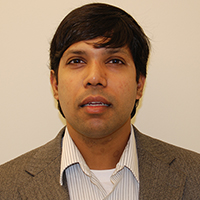
Roger Narayan, North Carolina State University
Roger Narayan is a distinguished professor in the Joint Department of Biomedical Engineering at the University of North Carolina and North Carolina State University. He serves as an editorial board member for several academic journals, including as associate editor of Applied Physics Reviews. Narayan has edited several books, including the textbook Biomedical Materials, Second Edition, the handbook Materials for Medical Devices, and the Encyclopedia of Biomedical Engineering. He has previously served as director of the TMS Functional Materials Division, the ASM International Emerging Technologies Awareness Committee, and the American Ceramic Society Bioceramics Division. As the 2016-2017 ASME Swanson Fellow, Narayan worked with America Makes on several activities to disseminate additive manufacturing technology, including the development of a workforce/education/outreach roadmap for additive manufacturing, and the development of a repository containing educational materials related to additive manufacturing. He has received several honors, including the NCSU Alcoa Foundation Engineering Research Achievement Award, the University of North Carolina Jefferson-Pilot Fellowship in Academic Medicine, the National Science Faculty Early Career Development Award, the Office of Naval Research Young Investigator Award, and the American Ceramic Society Richard M. Fulrath Award. He has been elected as Fellow of AAAS, ASME, ASM International, AIMBE, and American Ceramic Society.

Translational Bioelectronics
Bioelectronics describes the interfacing of engineered electronic systems with biological tissues, or alternatively electronic devices that take on bio-inspired functionality. With improvements and innovation in both active and passive materials, bioelectronic systems are poised to make significant advances in diagnostics and therapeutics as well as robotics and prosthetics. With advances in materials, devices, and systems, considerations for implementation takes on added importance. The push for clinical and commercial translation, especially from early state concepts and prototypes requires special consideration, limitations, and barriers. This workshop highlighted established and up-and-coming concepts in bioelectronics across a number of application areas. It also featured barriers and considerations for translation, and showcased examples of early stage clinical implementation and commercialization.
Program and Speakers
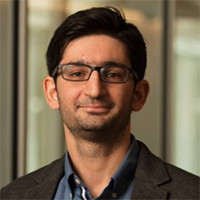
Translational Neuroelectronics
Dion Khodagholy, Columbia University
Dion Khodagholy is an assistant professor in the Department of Electrical Engineering, School of Engineering and Applied Science at Columbia University. He received his Master’s degree from the University of Birmingham in Electronics and Telecommunication Engineering. This was followed by a second Master’s degree in Microelectronics at the Ecole des Mines. He attained his PhD degree in Microelectronics at the Department of Bioelectronics (BEL) of the Ecole des Mines. He completed a postdoctoral fellowship in systems neuroscience at New York University, Langone Medical Center. His research aims to use unique properties of materials for the purpose of designing and developing novel electronic devices that allow efficient interaction with biological substrates, specifically neural networks and the brain. This process involves design, characterization, and fabrication of high-performance biocompatible electronics to acquire and analyze neural data. The ultimate goal is to translate such advances in electronics, materials and neuroscience into more effective diagnostics and treatments for neuropsychiatric diseases.
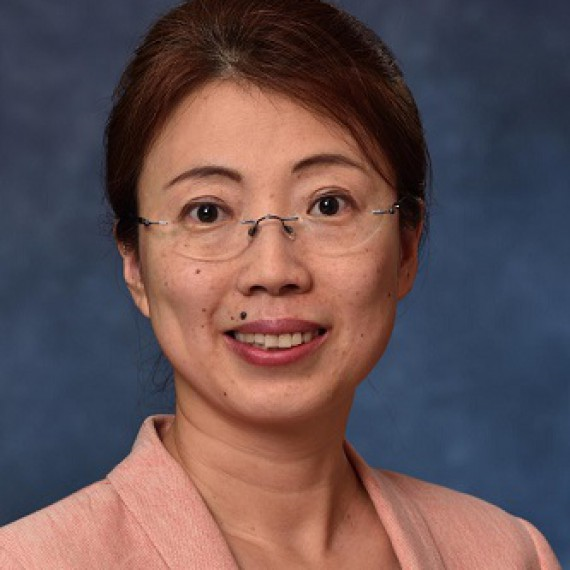
Biomaterials Strategies Towards Seamless Tissue Integration of Bioelectronics
Tracy Cui, University of Pittsburgh
Tracy Cui is the William Kepler Whiteford Professor of Bioengineering at the University of Pittsburgh and the Director of the Neural Tissue/Electrode Interface and Neural Tissue Engineering Laboratory. Cui earned her BE degree in polymer materials and chemical engineering and her MS degree in biophysics at Tsinghua University. She earned her PhD degree in macromolecular science and engineering at the University of Michigan. In Cui’s lab, the primary research focus is on the interactions between neural tissue and smart biomaterials with special focuses on neural electrode-tissue interface, neural tissue engineering, central nervous system drug delivery, and biosensors. Cui has won numerous awards, including the 2017 Fellow of Royal Society of Chemistry, 2016 Fellow of American Institute of Medical and Biological Engineering, 2013 and 2014 Peking University Engineering Globex Fellow, 2013 Carnegie Science Emerging Female Scientist Award, 2009, 2011 and 2015 Pitt Innovator Award, 2008 National Science Foundation Career Award and 2005 Wallace Coulter Foundation Translational Early Career Award. She is on the editorial board of the Current Opinion in Biomedical Engineering, Journal of Materials Chemistry B, Journal of Neural Engineering, and Advanced NanoBiomed Research.
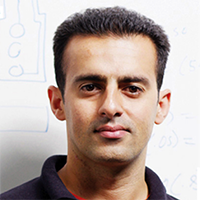
Soft and Wearable Microfluidic Systems for Personalized Physiological and Metabolic Health Tracking and Management
Roozbeh Ghaffari, Northwestern University
Roozbeh Ghaffari is co-founder and CEO of Epicore Biosystems, Inc., a company developing a proprietary wearable microfluidic sensing platform. He also serves as an associate research professor in the Department of Biomedical Engineering at Northwestern University, and is Director of Translational Research at the Querrey-Simpson Institute for Bioelectronics. Ghaffari holds BS and MS degrees in electrical engineering from the Massachusetts Institute of Technology. He received his PhD degree in biomedical engineering from the Harvard Medical School-MIT Program in Health Sciences and Technology. Upon completion of his PhD degree, Ghaffari co-founded MC10 Inc (acquired by Medidata Inc), and served as Chief Technology Officer. In this role, he led the development and commercial launch of the BioStamp health monitoring platform. His contributions in soft bioelectronics, micro/nano-scale systems, and auditory neuroscience research have been recognized with the Helen Carr Peake PhD Research Prize, MIT 100K Grand Prize, and MIT Technology Review Magazine's Top 35 Innovators Under 35. He has published over 100 academic papers and is inventor on over 50 issued patents.
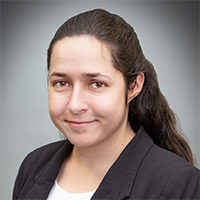
Biohybrid Robotics and Challenges on the Path to Translation
Vickie Webster-Wood, Carnegie Mellon University
Vickie Webster-Wood is an assistant professor in the Department of Mechanical Engineering at Carnegie Mellon University with courtesy appointments in the Department of Biomedical Engineering and the McGowan Institute of Regenerative Medicine. She is the director of the C.M.U. Biohybrid and Organic Robotics Group and has a long-term research goal to develop completely organic, autonomous robots with programmable neural circuits. Research in the C.M.U. B.O.R.G. brings together bio-inspired robotics, tissue engineering, and computational neuroscience to study and model neuromuscular control and translate findings to the creation of renewable robotic devices. Webster-Wood completed her postdoc as an N.I.H. Ruth L. Kirschstein N.R.S.A. Postdoctoral Fellow at Case Western Reserve University in the Tissue Fabrication and Mechanobiology Lab. She received her PhD degree in Mechanical Engineering from the same institution as an N.S.F. Graduate Research Fellow in the Biologically Inspired Robotics Lab. She received the NSF CAREER Award in 2021 and is a co-PI of the N.S.F. NeuroNex Network on Communication, Coordination, and Control in Neuromechanical Systems (C3NS). Her work has been featured by many media outlets, including features in Popular Mechanics, NPR’s Science Friday, and a video segment in FOX’s Nature Knows Best.
Moderator
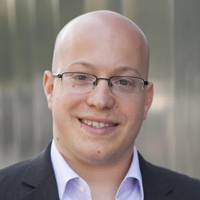
Jonathan Rivnay, Northwestern University
Jonathan Rivnay earned his BS degree in 2006 from Cornell University. He then moved to Stanford University where he earned MS and PhD degrees in Materials Science and Engineering, studying the structure and electronic transport properties of organic electronic materials. In 2012, he joined the Department of Bioelectronics at the Ecole des Mines de Saint-Etienne in France as a Marie Curie post-doctoral fellow, working on conducting polymer-based devices for bioelectronics. Rivnay spent 2015-2016 as a member of the research staff in the Printed Electronics group at the Palo Alto Research Center before joining the Department of Biomedical Engineering at Northwestern University in 2017. He is a recipient of an NSF CAREER award, ONR Young Investigator award, and has been named an Alfred P. Sloan Research Fellow, and MRS Outstanding Early Career Investigator.

Machine Learning and Artificial Intelligence in Biomaterials Design and Development
Machine learning (ML) and artificial intelligence (AI) have been transformative in areas of chemistry and materials in which large datasets have or can be generated. However, when data is scarce and expensive, as is the case for biomaterials design, computational modeling has been limited. Computer-aided design of biomaterials often relies on ab initio modeling (e.g., molecular dynamics), which require no data but cannot predict complex properties such as biomaterial mechanics, optical properties, or in vitro or in vivo behavior or efficacy. Thus, human intuition coupled with experimental trial and error is often state-of-the-art for design of new biomaterials. These conventional approaches to develop biomaterials are expensive and laborious and have significantly slowed the translation of new biomedical devices into clinical practice. To address this hurdle, innovative approaches include the use of ML and AI design with a long-term goal of a (bio)materials genome. This workshop provided an overview of the broader field of ML and AI and how advances in computational power coupled with big data analysis and innovations in machine learning, modeling, and simulation are enabling artificial intelligence to revolutionize biomaterials design and development.
Program and Speakers

Learning to Control AI Models for Accelerated Delivery
Payel Das, AI Science, Thomas K. Watson Research Center, IBM Research
Payel Das is a principal research staff member and a manager at IBM Research AI, IBM Thomas J Watson Research Center. She has also been an adjunct associate professor at the department of Applied Physics and Applied Mathematics (APAM), Columbia University. She received her PhD degree in theoretical biophysics from Rice University. Currently, she leads research on trustworthy AI in the low-data regine and machine creativity. A central focus is on developing controllable generative AI and efficient black-box optimization techniques. The goal is to enable reliable modeling of complex systems and efficient synthesis of novel and useful designs for various downstream business and scientific applications, including drug discovery and material design. Das has served as the editorial advisory board member of the ACS Central Science Journal. She is the recipient of two IBM Outstanding Technical Achievement Awards (the highest technical award at IBM), two IBM Research Division Awards, one IBM Eminence and Excellence Award, and six IBM Invention Plateau Awards.
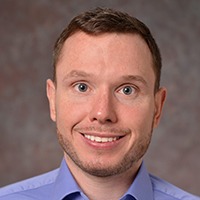
Data-Driven Discovery of Nano-Biomaterials with Machine Learning Guided Automation
Adam Gormley, Rutgers University
Adam Gormley is an assistant professor of Biomedical Engineering at Rutgers University and an expert in nanobiomaterials. Prior to Rutgers, Adam was a Marie Skłodowska-Curie Research Fellow at the Karolinska Institutet and a Whitaker International Scholar at Imperial College London in the laboratory of Professor Molly Stevens. He obtained his PhD degree in Bioengineering from the University of Utah in the laboratory of Professor Hamid Ghandehari, and a BS degree in Mechanical Engineering from Lehigh University. In January 2017, Adam started the Gormley Lab which seeks to develop bioactive nanobiomaterials using robotics and artificial intelligence. Gormley is currently the PI of an NIH R35 Outstanding Investigator Award, an NSF CBET Award, and an NSF Designing Materials to Revolutionize and Engineer our Future (DMREF) Award.
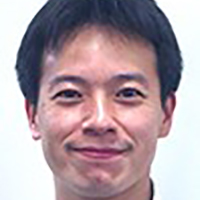
Anti-biofouling Monolayers: The Mechanism and Molecular Designs
Tomohiro Hayashi, Tokyo Institute of Technology
Tomohiro Hayashi received his PhD degree in 2003 from Ruprecht-Karls-Universität Heidelberg. He joined Tokyo Institute of Technology in 2003 as a postdoc researcher and was promoted to an associate professor in 2010. His specialist areas are surface and interface science, scanning probe microscopy, materials informatics, and computer simulations. He has been awarded 11 academic prizes, including the Asahi Kasei award of the Society of Polymer Science, Japan (2011).
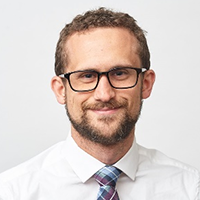
Interactive Peptide Biomaterials Discovery with Maximum Entropy Methods and Deep Learning
Andrew White, University of Rochester
Andrew White graduated from Rose-Hulman Institute of Technology in 2008 with a BS degree in chemical engineering. While at Rose, he spent a year studying at the Otto-von Guericke Universität and the Max Planck Institute for Dynamics of Complex Technical Systems in Magdeburg, Germany. White completed a PhD degree in chemical engineering at the University of Washington in 2013. Next, White worked with Professor Greg Voth at University of Chicago as a postdoctoral fellow in the Institute for Biophysical Dynamics from 2013-2014. In Chicago, he developed new methods for combining simulations and experiments. White joined the University of Rochester in Chemical Engineering in 2015 and is currently an associate professor. He has joint appointments in the Chemistry Department, Biophysics, Materials Science, and Data Science programs. White received a National Science Foundation CAREER award in 2018 and an Outstanding Young Investigator Award from the National Institutes of Health in 2020.
Moderator
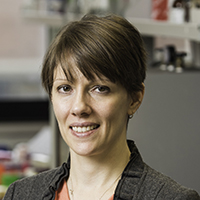
Danielle Benoit, University of Rochester
Danielle Benoit is a professor within the Department of Biomedical Engineering with appointments in Chemical Engineering and the Center for Musculoskeletal Research and is also the Director of Materials Science Program at the University of Rochester. She directs the Therapeutic Biomaterials Laboratory, which specializes in the rational design of polymeric materials for regenerative medicine and drug delivery applications. Her work has provided insights into the translation of tissue engineering strategies for bone allograft repair, development of pH-responsive nanoparticles for nucleic acid and small molecule drug delivery, and novel targeting strategies for bone-specific delivery of therapeutics. Benoit has been recognized by numerous awards and accolades for her research program including 2019 Class of AIMBE Fellows, the 2018 University of Maine Distinguished Alumni Award, the 2016 Kate Gleason Young Engineer of the Year Award, a 2015 Young Innovator Award in Cellular and Molecular Bioengineering, an NSF CAREER Award, and Alex’s Lemonade Stand Young Investigator Award. She is also a standing member of the NIH Biomaterials and Biointerfaces Study Section. Benoit received her undergraduate degree in Biological Engineering from the University of Maine and MS and PhD degrees in Chemical Engineering from the University of Colorado. She then trained at the University of Washington where she was the Merck Fellow of the Damon Runyon Cancer Research Foundation. Benoit joined the faculty at the University of Rochester in 2010.

Biomaterials Science and Engineering to Address Unmet Needs in Women’s Health
Women’s health continues to be an important and understudied area of research. Materials scientists and engineers have a long history of working with medical practitioners to solve problems related to human health and have the potential role to create solutions specific to women’s health issues. This workshop addressed recent materials developments in women’s health, and the need for biomaterials approaches and collaborations in this broad area was discussed. The workshop provided an overview of opportunities for materials scientists and engineers to characterize materials, design model tissue systems, and apply computational methods in order to understand normal tissue as well as disease progression in women’s health. This included topics such as biomaterials for replicating gynecological cancer, biomaterials and computational modeling approaches for building placental models, and biomaterials for building models of the endometrium. This perspective hoped to encourage and inspire future researchers, while engaging current researchers to think about redirecting their skills and efforts to addressing unmet needs in women’s health.
Program and Speakers
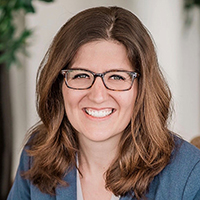
Engineering High Throughput Screening Platforms of Cervical Cancer
Kaitlin Fogg, Oregon State University
Kaitlin Fogg is an assistant professor in Chemical, Biological, and Environmental Engineering at Oregon State University. She earned her PhD degree in Biomedical Engineering at the University of California, Davis, carrying out her thesis work focused on tissue engineering with Dr. Kent Leach. She then went on to complete a postdoctoral fellowship in cancer systems biology with Dr. Pamela Kreeger at the University of Wisconsin-Madison, where she used in vitro models of disease and statistical modeling techniques to investigate the interactions of the immune system and ovarian cancer. She is the recipient of a pre-doctoral fellowship from the American Heart Association, a Scientific Scholar award from the Rivkin Center for Ovarian Cancer Research, and was named a Shooting Star at the 2018 Cellular and Molecular Bioengineering Conference. Her work focuses on developing multicellular models of gynecological disease in order to better understand signaling dynamics and identify potential therapeutic targets.
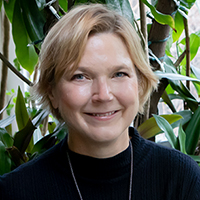
Deconstructing and Reconstructing the Endometriosis/Adenomyosis Patient
Linda Griffith, Massachusetts Institute of Technology
Linda G. Griffith is Professor of Biological and Mechanical Engineering and MacVicar Fellow at Massachusetts Institute of Technology, where she directs the Center for Gynepathology Research. She has pioneered approaches in tissue engineering and organs-on-chips and now integrates these platform technologies with systems biology to humanize drug development. She has chaired numerous scientific meetings, including the Keystone Tissue Organoids Conference (2020), the Signal Transduction by Engineering Extracellular Matrix Gordon Research Conference (2016), and has co-chaired the Open Endoscopy Forum at MIT annually since 2015. She is a member of the National Academy of Engineering and recipient of a MacArthur Foundation Fellowship, and several awards from professional societies. Griffith currently serves on the advisory board of the Society for Women’s Health Research and has served on the Advisory Committee to the Director of the National Institutes of Health. She received her BS degree from Georgia Tech and PhD degree from UC Berkeley, both in chemical engineering.
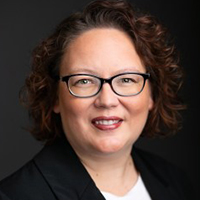
Biomaterials Studies of the Extra-Embryonic Fetal Support Structures - Placenta and Fetal Membranes
Michelle Oyen, East Carolina University
Michelle L. Oyen is an associate professor of Biomedical Engineering in the Department of Engineering, East Carolina University. Prior to joining ECU in 2018, she was based at the Cambridge University Engineering Department in Cambridge, England, where she was a Lecturer (2006-2013) and Reader (2013-2018) in Bioengineering as well as a Fellow (2012-2018) of Homerton College Cambridge. Michelle has degrees in Materials Science and Engineering (BS), Engineering Mechanics (MS), and a PhD degree in Biophysical Sciences. Her research interests are in biomaterials, biomechanics, tissue engineering, and in the emerging field of using bioengineering tools for studying pregnancy.
Moderator
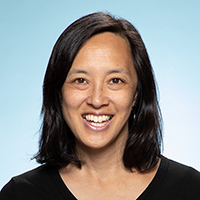
Joyce Wong, Boston University
Joyce Y. Wong is a professor of Biomedical Engineering and Materials Science & Engineering at Boston University. She is a Fellow of the NAI, AAAS, AIMBE, BMES, and IAMBE. She was recently elected President-Elect of AIMBE. Her research focuses on developing biomaterials for the early detection and treatment of disease. Her current projects include pediatric bioengineered blood vessel patches, ultrasound contrast agents to detect and treat abdominal surgical adhesions, and most recently, development of biomaterial systems for women’s reproductive health. In 2017, she received the Charles DeLisi Distinguished Lecture and Award, the highest honor in Boston University’s College of Engineering. In 2020, she received the Clemson Award for Basic Research from the Society for Biomaterials. She is currently Deputy Editor for Science Advances and an Associate Editor of Stem Cell Research & Therapy. In 2014, as the Inaugural Director of a Boston University Provost Initiative promoting women in STEM at all levels from K-12 to faculty, she launched ARROWS (Advance, Recruit, Retain & Organize Women in STEM). She also led Boston University’s Bronze Award for AAAS SEA (STEM Equity Achievement) Change and is part of the BU team recently awarded a NIH Prize for Enhancing Faculty Gender Diversity from the Office of Research on Women’s Health. She has served as Member-at-Large for SFB and currently is a member of the SFB Awards Committee. She has served as Volume Editor for MRS and is co-organizer of one of the Fall 2021 MRS-SFB webinars.
